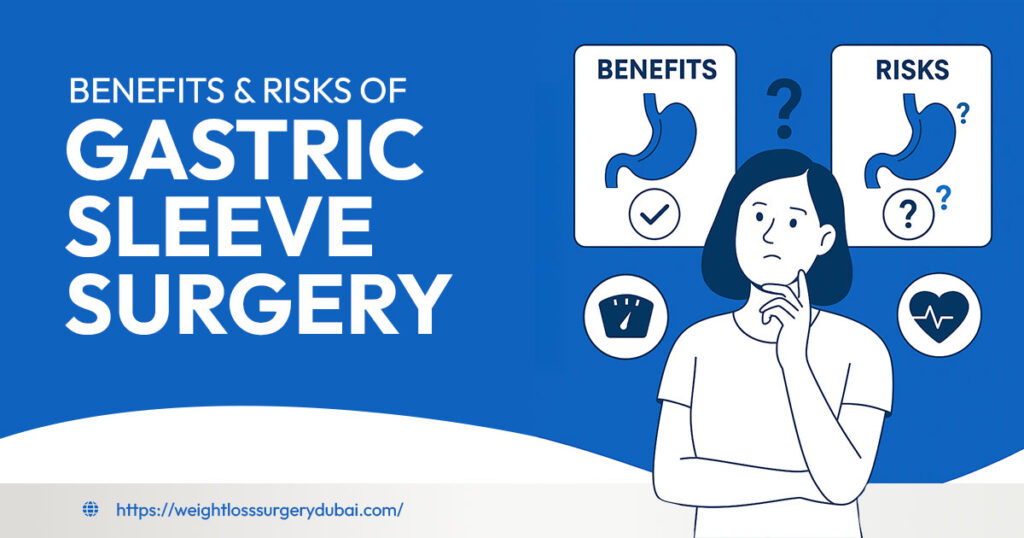
Gastric sleeve surgery, also known as sleeve gastrectomy, is a widely performed bariatric procedure designed to help individuals struggling with obesity achieve significant and lasting weight loss. During the procedure, approximately 75-80% of the stomach is removed, leaving behind a smaller, sleeve-shaped stomach. This reduction in stomach size not only limits food intake but also decreases the production of ghrelin, the hormone responsible for hunger, helping patients control their appetite more effectively.
This surgery is particularly beneficial for those who have been unable to lose weight through diet and exercise alone and who suffer from obesity-related health conditions such as diabetes, high blood pressure, and sleep apnea. While gastric sleeve surgery offers numerous advantages, it is also a major medical procedure with potential risks( can be minimised by choosing an experienced bariatric surgeon). Understanding both the benefits and drawbacks is essential for anyone considering this weight loss option.
Benefits of Gastric Sleeve Surgery
Significant and Sustainable Weight Loss
One of the primary benefits of gastric sleeve surgery is its ability to facilitate substantial weight loss. Most patients lose 50-70% of their excess weight within the first 6 to 12 months post-surgery. This weight reduction can lead to an improved quality of life, co-morbidities and greater self-confidence.
Improvement in Obesity-Related Health Conditions
Gastric sleeve surgery often leads to significant improvements or even remission of obesity-related health conditions, including:
- Type 2 diabetes
- High blood pressure
- Sleep apnea
- Heart disease
- PCOS ( in females)
- High cholesterol
- knee/ back pain
Many patients experience reduced dependence on medications and an overall enhancement in their well-being.
No Foreign Objects or Adjustments Required
Unlike gastric banding, which involves inserting a device that requires adjustments, gastric sleeve surgery does not involve any foreign objects. This eliminates the risk of complications such as band slippage, erosion, or infection.
Reduced Hunger and Appetite Control
The procedure involves removing a large portion of the stomach, which significantly reduces the production of ghrelin, the hunger hormone. This leads to decreased appetite and helps patients maintain long-term weight loss with a lower tendency to overeat.
Faster Recovery and Shorter Hospital Stay
Compared to other bariatric procedures, gastric sleeve surgery generally has a shorter hospital stay and recovery period. Most patients can resume their normal activities within two to four weeks, making it a more convenient option for those with busy lifestyles.
Risks and Considerations of Gastric Sleeve Surgery
Permanent and Irreversible Procedure
Unlike gastric banding, which can be adjusted or removed, gastric sleeve surgery is irreversible. Since a portion of the stomach is permanently removed, patients must commit to lifelong dietary and lifestyle changes to maintain their results.
Risk of Surgical Complications
As with any surgery, there are risks involved, including:
- Infection
- Blood clots
- Staple line leaks
- Adverse reactions to anesthesia
While these complications are relatively rare, they should be considered before undergoing surgery.
Nutritional Deficiencies
Due to the smaller stomach capacity, patients may struggle with absorbing essential nutrients, leading to deficiencies in:
- Vitamin B12
- Iron
- Calcium
Long-term supplementation and regular health checkups are necessary to prevent these deficiencies and maintain optimal health.
Potential for Weight Regain
Although gastric sleeve surgery is highly effective, some patients may regain weight if they do not adhere to the recommended lifestyle changes. Poor dietary choices, lack of physical activity, and emotional eating can contribute to weight regain over time.
Increased Risk of Acid Reflux
Some patients experience worsening acid reflux or new-onset gastroesophageal reflux disease (GERD) after gastric sleeve surgery. In severe cases, additional treatment or medication may be required to manage symptoms effectively.
Is Gastric Sleeve Surgery Right for You?
Gastric sleeve surgery is a powerful tool for weight loss, but it is not suitable for everyone. Prospective patients should undergo a thorough evaluation with a bariatric specialist to determine their eligibility and readiness for the necessary lifestyle changes.
For those committed to a healthier lifestyle, this procedure can provide life-changing benefits. If you are considering gastric sleeve surgery, consult with a qualified bariatric surgeon to explore your options and make an informed decision that best suits your health and long-term goals.
What’s new in Gastric Sleeve Surgery
With the introduction of single stapler sleeve gastrectomy( Teleflex)Gastric sleeve surgery procedure has become faster,with faster recovery , less postop. nausea , vomitings , less chances of other complications & is highly recommended , also is getting very popular.
